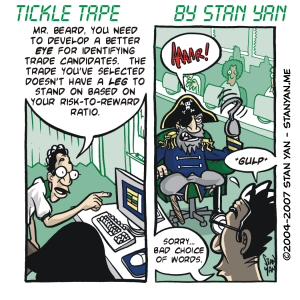The winning trader has an intuitive feel for the markets. To trade profitably one must execute a trading strategy under ideal market conditions. If market conditions don’t match the strategy, the trade will likely fail. There’s a lot of information to process and act upon, such as various signals, correlated indicators, underlying trends, unexpected media reports, or adverse events. Ideally, we would like to trade with infallible information, and it would be nice to be able to review all possible information in order to make an informed decision.
Unfortunately, the mind has limits (and information is far from perfect). It’s possible to experience information overload. The mind can process only a fixed amount of information. Once this limit is met, any additional information is ignored. But it is possible to expand the capacity of the mind. One can over-learn a task, such as information processing, to the point that it can be done automatically, without conscious thought.
The best example of automatic processing is driving a car. When you first learned to drive a car, it was very deliberate. You carefully hit the brakes when you anticipated oncoming traffic and consciously refocused your attention on accelerating after the trouble had passed. As you gained driving experience, however, much of your driving behavior became “automatic” in that you no longer had to pay attention to it. Now, as an experienced driver, you can easily do many tasks simultaneously as you drive. Similar experiences occur in sports. When you practice a new golf swing, for example, you must be very deliberate initially; otherwise, you’ll fall back into your old way of doing things. By deliberately practicing the swing over and over again, though, you’ll eventually be able to execute the swing naturally, effortlessly, and at times, flawlessly.
The same process occurs with trading. It’s possible through over-learning to read signals and execute trades so well that one can get an accurate, intuitive feel for the markets, and react to market conditions almost in an instinctive way. For example, you may no longer need to carefully evaluate certain trade setups closely. You now can act on your “hunch” or “intuition” and be right most of the time. This form of automatic processing allows you to trade efficiently. It is worth gaining as much experience as possible and practices trading under a variety of market conditions in order to trade automatically.
That said, it is also important, however, to look at the downside of trading on automatic pilot. There are times when it can lead to errors and losses. Market conditions are continually changing and a strategy that worked last week may not work today. When this happens, you must learn to use a new strategy. Trading automatically can produce losses when using outdated strategies or looking for setups that no longer suggest a profitable trade. The winning trader has the ability to recognize when methods and strategies must be revised. So even though it is useful to be able to trade automatically in order to maximize limited psychological resources, it is also essential to acknowledge its potential limitations.
Trading efficiently requires maximizing all available resources. Over-learning, in order to build up solid trading skills, is one way to maximize limited psychological resources. But it can be a drawback if one trades too automatically without realizing that market conditions may have changed. Be aware of the strong tendency to react without thinking. However, if you can trade automatically when appropriate and deliberately when it is necessary, you’ll find that you can maximize your limited psychological energy and trade profitably and consistently.

